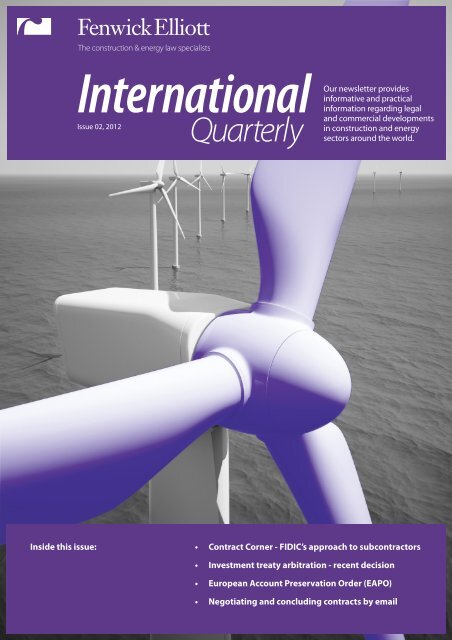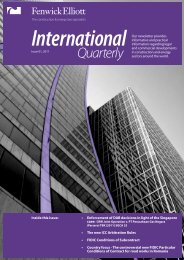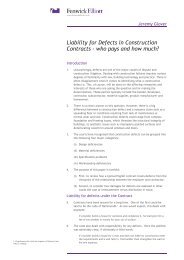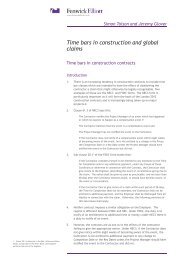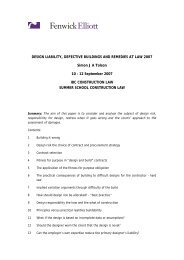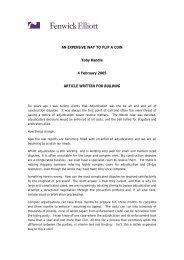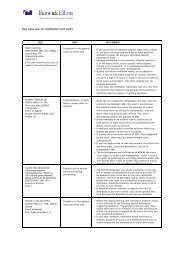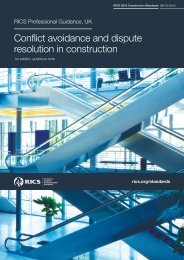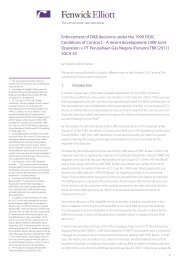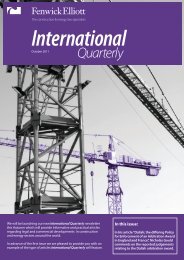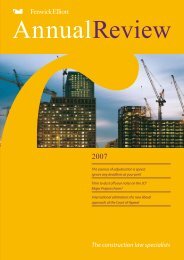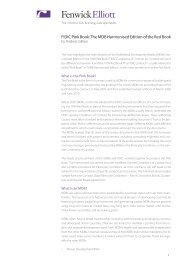download PDF - Fenwick Elliott
download PDF - Fenwick Elliott
download PDF - Fenwick Elliott
Create successful ePaper yourself
Turn your PDF publications into a flip-book with our unique Google optimized e-Paper software.
Issue 02, 2012<br />
Our newsletter provides<br />
informative and practical<br />
information regarding legal<br />
and commercial developments<br />
in construction and energy<br />
sectors around the world.<br />
Inside this issue:<br />
• Contract Corner - FIDIC’s approach to subcontractors<br />
• Investment treaty arbitration - recent decision<br />
• European Account Preservation Order (EAPO)<br />
• Negotiating and concluding contracts by email
Contract Corner:<br />
A review of typical contact clauses<br />
Issue 02, 2012<br />
FIDIC’s approach to subcontractors<br />
A new feature where in every issue we<br />
look at typical contract clauses<br />
By Jeremy Glover<br />
Partner, <strong>Fenwick</strong> <strong>Elliott</strong><br />
In our last edition of International<br />
Quarterly, we looked at the new FIDIC<br />
subcontract, so in the first in our new<br />
regular feature – Contract Corner, it<br />
seemed appropriate to look at how, in this<br />
instance, the FIDIC contracts deal with sub<br />
contactors.<br />
(iii) The prior consent of the engineer is<br />
required 1 for all subcontractors apart<br />
from suppliers and subcontractors<br />
named in the contract;<br />
(iv) The contractor must give the<br />
engineer 28-days notice of both the<br />
intended and actual commencement<br />
date of any subcontractor’s work; and<br />
(v) The subcontract must contain<br />
suitable provisions entitling the<br />
employer to require the subcontract<br />
to be assigned to him in the event of<br />
termination.<br />
appointed by the contractor but also to<br />
the subcontractors nominated by the<br />
employer in accordance with clause 5 of<br />
the Red Book 2 .<br />
It is important that the contractor<br />
appreciates how wide the obligations here<br />
are. The contractor is responsible for all the<br />
acts and defaults of the subcontractors.<br />
This is why under sub-cl.2.2 of the FIDIC<br />
Subcontract 2011, the subcontractor is to<br />
assume the duties and obligations, of the<br />
contractor under the main contract which<br />
relate to the subcontract Works 3 .<br />
What does the clause mean?<br />
The key clause is sub-clause 4.4. Under<br />
the Red Book, the basic obligation can be<br />
broken down as follows:<br />
(i)<br />
Unless otherwise agreed the<br />
contractor cannot subcontract the<br />
whole of the Works;<br />
(ii) The contractor remains wholly<br />
responsible to the employer for the<br />
acts of that subcontractor as if those<br />
acts had been carried out by him;<br />
There are certain differences across the<br />
FIDIC Rainbow suite. For example, under<br />
the Silver Book, the contractor only has to<br />
notify the employer of the appointment<br />
of a subcontractor giving details of that<br />
parties’ experience and when they are<br />
to start; whilst only the Red and Pink<br />
books contain the assignment provision<br />
noted at point (v) above. Under the Gold<br />
Book, if the subcontractor is entitled to<br />
any relief from risk on broader terms<br />
than those specified between contractor<br />
and employer, then those additional<br />
circumstances shall not serve as an excuse<br />
for non-performance by the contractor.<br />
What all version do, however, is to make<br />
it clear that the contractor is wholly<br />
responsible for the performance of<br />
the subcontractors. This obligation<br />
extends not only to the subcontractors<br />
Typical amendments<br />
There are a number of amendments<br />
that are often made to these clauses.<br />
Some follow the lead of the Pink Book, in<br />
requiring that the contractor shall ensure<br />
that the requirements of confidentiality<br />
imposed on the contractor by sub-clause<br />
1.12 apply equally to each subcontractor.<br />
1<br />
Where the engineer’s consent to any proposed sub¬contracting is required, it cannot be unreasonably withheld or delayed.<br />
2<br />
Or clause 4.5 of the others.<br />
3<br />
For example, under English Law a contractor is not necessarily responsible for any design carried out by a nominated subcontractor or compliance with performance<br />
specification and selection of goods and materials. In those circumstances the contractor would only be liable for poor workmanship and poor quality of goods and<br />
materials.
Contract Corner:<br />
A review of typical contact clauses<br />
Issue 02, 2012<br />
Also, the Pink Book, requires that where<br />
practicable, the contractor shall give fair<br />
and reasonable opportunity for contractors<br />
from the country where the pojrect is sited<br />
to be appointed as subcontractors. This is<br />
a typical requirement where the funding<br />
comes from the World Banks and other<br />
similar funding insitutions. And if there is<br />
no actual formal contractual clause, such<br />
a requirment will often form part of the<br />
tender critieria.<br />
As noted above, if the subcontractor<br />
is named in the contract or if the<br />
subcontractor will merely be supplying<br />
materials, then the consent of the engineer<br />
is not required. In all other circumstances,<br />
the consent of the engineer will be needed.<br />
The Pink Book puts forward a practical<br />
option suggesting dispensing with prior<br />
consent if the value of the proposed subcontract<br />
is very small compared with the<br />
overall contract value.<br />
A typical requirement imposed on<br />
contractors follows from the requirement<br />
that although the contractor cannot<br />
subcontract the whole of the project<br />
works, he can subcontract a part of them.<br />
Often, a percentage limit or restriction will<br />
be placed on the contractor’s ability to do<br />
this in the tender documentation. This is<br />
all part of the trend towards restricting the<br />
abilty to subcontract.<br />
Going further than imposing percentage<br />
limits, employers will often look to ensure<br />
that key equipment or materials are<br />
provided by particular subcontractors.<br />
Remember there are no nomination<br />
provisions in the Silver Book.<br />
Employers often look to adopt similar<br />
provisions from the Red Book giving<br />
them the right of approval of certain<br />
subcontractors into the Yellow and Gold<br />
Books. Where the contractor is responsible<br />
for the design, if that responsibility is to<br />
be subcontracted, an employer may also<br />
look for a warranty from the subcontractor<br />
in question. Taking this control one step<br />
further, employers will often look to the<br />
right to approve the actual subcontract<br />
itself.<br />
It will be interesting to see whether FIDIC<br />
gets round to drafting subcontracts for the<br />
Yellow or Silver Book and if so, whether<br />
any of these typical amendments find a<br />
way into them. Alternatively when FIDIC<br />
releases the draft of the new Yellow Book,<br />
which is due out later this year, will it<br />
decide to make any amendments to the<br />
subcontracts clauses.<br />
Jeremy Glover, Partner<br />
<strong>Fenwick</strong> <strong>Elliott</strong><br />
+44(0)207 421 1986<br />
jglover@fenwickelliott.com
Commentary:<br />
International dispute resolution & arbitration<br />
Issue 02, 2012<br />
India held liable for failure to enforce an ICC<br />
arbitral award<br />
By David Robertson<br />
Partner, <strong>Fenwick</strong> <strong>Elliott</strong><br />
A recent investment treaty arbitration<br />
decision highlights the potential value of<br />
bilateral investment treaties in supporting<br />
the enforcement of international arbitral<br />
awards.<br />
Bilateral investment treaties<br />
Bilateral investment treaties (BITs) are<br />
agreements between two States which<br />
are intended to promote trade between n<br />
those two countries. All BITs are different.<br />
However, they typically contain clauses<br />
protecting the rights of investors from one<br />
State when making investments in the<br />
other.<br />
The types of rights which are typically<br />
protected include:<br />
• the right to receive equal treatment<br />
to that given to local companies and<br />
to other foreign investors<br />
• the right not to have your<br />
investment taken (or expropriated) by<br />
the Government; and<br />
having to bring any action in the host<br />
State’s own courts.<br />
BITs can be directly relevant to companies<br />
working in the construction and<br />
engineering sectors as investment treaty<br />
cases have found that construction<br />
contracts are an investment which can<br />
be protected. Therefore, if the actions of<br />
a host State (whether in its capacity as a<br />
project participant or in another<br />
If you do have a claim under a Bilateral<br />
Investment Treaty, that claim is made<br />
not against your contract counterparty<br />
directly (unless that counterparty is the<br />
government) but against the central<br />
government, for failing to ensure that one<br />
if its subdivisions or agencies complied<br />
with their treaty obligations.<br />
Claiming directly against a host State<br />
could obviously have serious commercial<br />
(and political) implications. However,<br />
this is becoming an increasingly popular<br />
method of o protecting investor rights in<br />
foreign countries and the final awards<br />
are more easily enforced than private<br />
international arbitration awards.<br />
When you are looking at<br />
business opportunities in a new<br />
country – or if you have a large<br />
value dispute which has proven<br />
difficult to resolve – it is worth<br />
investigating whether a BIT remedy may<br />
be available.<br />
The India decision – White Industries<br />
Australia Limited v Republic of India<br />
(UNCITRAL)<br />
• the right to insist that the<br />
Government honours its obligations<br />
under a contract.<br />
BITs will usually allow an aggrieved<br />
investor to bring an action directly<br />
against the host State Government in<br />
international arbitration, rather than<br />
regulatory or enforcement capacity)<br />
causes an ‘investor’ to suffer losses in<br />
connection with a project, a remedy may<br />
be available under a BIT (if one exists<br />
between the host State and the investor’s<br />
home State).<br />
Coal India Limited (CIL) and White Idustries<br />
Australia Limited signed an agreement<br />
in September 1989 for the turnkey<br />
development of the open-cast coal mine<br />
at Piparwar in Uttar Pradesh, India. The<br />
agreement contained an arbitration clause<br />
providing for ICC arbitration with Paris as<br />
the seat.
Commentary:<br />
International dispute resolution & arbitration<br />
Issue 02, 2012<br />
During the course of the project, disputes<br />
arose in relation to the deduction of<br />
penalties by CIL. Ultimately these were<br />
referred to arbitration. In March 2002 an<br />
ICC Tribunal issued a substantial award<br />
in White Industries’ favour. From 2002<br />
onwards White Industries attempted,<br />
unsuccessfully, to enforce that award<br />
through the Indian courts. At the<br />
beginning of 2012, the action had reached<br />
the supreme court.<br />
In July 2010, frustrated with the lack of<br />
progress, White Industries commenced<br />
an action against India under the<br />
Australia-India BIT, claiming that India<br />
had breached its treaty obligation to<br />
provide a foreign investor with “effective<br />
means of asserting claims and enforcing<br />
rights”. What was interesting here was<br />
that this obligation was not one which<br />
was within the Australia - India BIT itself,<br />
but in a BIT entered into between India<br />
and Kuwait. However, the Australia - India<br />
BIT did contain what is known as a “most<br />
favoured nation” clause which means that<br />
White Industries were also to make use of<br />
provisions in other BIT’s if the provisions<br />
of that other BIT gave investors of another<br />
nation greater protection. White Industries<br />
also claimed it had been denied justice<br />
in violation of the obligation to provide<br />
“fair and equitable treatment” to foreign<br />
investors.<br />
Having decided that the ICC award<br />
was “an investement” 1 which could be<br />
protected under the BIT, the UNCITRAL<br />
tribunal agreed with White Industries that<br />
the nine-year delay by the Indian courts in<br />
acting to enforce White Industries’ award<br />
amounted to a breach of India’s obligation<br />
to provide an effective means of enforcing<br />
its rights.<br />
The Tribunal did not accept that India had<br />
breached its fair and equitable treatment<br />
obligation. This was because White<br />
Industries had not done everything it<br />
could to prevent the delay.<br />
Therefore, White Industries was awarded<br />
the amount due under the original ICC<br />
award plus interest dating from 2002 and<br />
costs. In other words, White Industries was<br />
awarded the amount it would have been<br />
entitled to but for the delays it faced in the<br />
Indian courts.<br />
Where there is a BIT in existence between<br />
the host State in which your project<br />
is located and your own country, the<br />
decision in White Industries v India will<br />
provide additional support in attempts<br />
to enforce arbitral awards. Where other<br />
attempts to enforce or negotiate payment<br />
against an award have been exhausted,<br />
the threat of direct action against the<br />
host State Government may very well<br />
introduce new pressures which could lead<br />
to a satisfactory result.<br />
David Robertson, Partner<br />
<strong>Fenwick</strong> <strong>Elliott</strong><br />
+44(0)207 421 1986<br />
drobertson@fenwickelliott.com<br />
ICC<br />
ICC (International Chamber of<br />
Commerce) is the voice of world<br />
business championing the<br />
global economy as a force for<br />
economic growth, job creation<br />
and prosperity.<br />
1 The ICC award was considered to be part of the contract because it dealt with the parties’ rights under that contract.
Universal view:<br />
International contractual issues around the globe<br />
Issue 02, 2012<br />
European Account Preservation Order (EAPO)<br />
By David Toscano<br />
Assistant, <strong>Fenwick</strong> <strong>Elliott</strong><br />
Overview<br />
In July 2011, the European Commission<br />
released its proposed European Account<br />
Preservation Order (EAPO) Regulation,<br />
currently under consideration by the<br />
European Parliament and the Council<br />
of the EU. In October 2011, the UK<br />
government announced that it would<br />
not opt in at this stage but<br />
will participate in future<br />
negotiations with a view to<br />
opting into the Regulation in<br />
the future.<br />
The proposed EAPO is<br />
designed to make it easier<br />
to recover debts in crossborder<br />
cases and will<br />
therefore create a new and<br />
additional type of freezing<br />
order, available throughout<br />
the EU to litigants in civil and<br />
commercial claims. It would<br />
broaden the range of tools available to<br />
enforce EU judgments and decisions<br />
including those obtained in construction<br />
disputes.<br />
What is an EAPO?<br />
It is important to stress that, at this stage,<br />
the draft Regulation has not yet become<br />
law, but potentially, its impact could be<br />
considerable.<br />
An EAPO is a freezing order which allows<br />
a creditor to freeze funds in any bank<br />
accounts held by a debtor and located<br />
within the EU. This applies to cash as<br />
well as financial instruments held in<br />
those accounts, including joint accounts.<br />
The purpose of freezing funds would be<br />
to satisfy payment of a debt, damages,<br />
interest or costs.<br />
The scope of an EAPO will apply to all<br />
monetary claims in civil and commercial<br />
matters where there is a cross border<br />
issue. This would include if either party or<br />
any of the bank accounts are domiciled<br />
outside the jurisdiction where the<br />
application is being made.<br />
At present, creditors are reliant on taking<br />
steps in the jurisdiction where the<br />
accounts are domiciled such as obtaining<br />
domestic freezing orders and third party<br />
debt orders or by seeking other forms of<br />
cross border enforcement such as using<br />
Worldwide Freezing Orders. These options<br />
require an undertaking to be given for any<br />
damages which might arise if the order<br />
should not have been granted.<br />
How would an EAPO be granted?<br />
An EAPO would be granted ex parte and<br />
a creditor could apply prior to or during<br />
its recovery action, or post-judgment as<br />
part of the enforcement process. The<br />
basic conditions for granting<br />
an EAPO are that the claim<br />
against the debtor “appears<br />
to be well founded” and that<br />
there is a “real risk” that the<br />
funds will be dispersed.<br />
Unlike a freezing order, an<br />
EAPO would not grant a<br />
creditor disclosure from the<br />
debtor of its asset information.<br />
Instead, it is proposed that the<br />
state in which the application<br />
is made would obtain the<br />
debtor’s bank details either<br />
by asking all banks in the<br />
jurisdiction whether the debtor holds<br />
an account with them or by referring to<br />
a central register. While some EU states<br />
already hold central registers, the UK does<br />
not and this would be a radical expansion<br />
of the steps English courts could take in<br />
enforcement proceedings.<br />
Once granted, an EAPO would be served<br />
on the debtor and the relevant bank. The<br />
bank would then be obliged to ensure
Universal view:<br />
International contractual issues around the globe<br />
Issue 02, 2012<br />
that the amount specified in the order<br />
remains in that account.<br />
Unlike similar orders currently available<br />
under English law, there is no duty<br />
for an EAPO applicant to give ‘full and<br />
frank disclosure’ of all relevant facts<br />
or any undertaking as to damages.<br />
Further where a creditor already has an<br />
enforceable judgment against the debtor,<br />
there are almost no conditions to be<br />
met for the issue of an EAPO, making it<br />
much more pro-creditor than current<br />
enforcement tools.<br />
Can an EAPO be challenged?<br />
A debtor can challenge an EAPO on<br />
the basis that the Court did not have<br />
jurisdiction to make the order or that<br />
the creditor had failed to meet the basic<br />
conditions.<br />
The EAPO proposal appears easier to<br />
obtain than to challenge. There is no<br />
discretion for the Court to refuse to grant<br />
the order if the basic conditions are met<br />
and it must do so within seven days of any<br />
application. In contrast, there is no tight<br />
timetable for dealing with challenges by<br />
a debtor who will be suffering from the<br />
effect of the freezing of its account. In<br />
England, the Courts are reluctant to issue<br />
a freezing order without hearing evidence<br />
from both parties.<br />
The current UK view<br />
As noted above, following a public<br />
consultation in January 2012, the UK<br />
government announced that it would not<br />
be opting in to the EAPO regime, although<br />
it would participate in the negotiations to<br />
agree the final wording of the Regulations.<br />
One significant factor behind this decision<br />
was concern over the lack of adequate<br />
safeguards for defendents. There is<br />
currently no general requirement for a<br />
claimant to provide security for any issues<br />
that might follow for the granting of an<br />
unjustified order. Equally, the courts are<br />
not given sufficient discretion to decide<br />
whether to grant an order or even decide<br />
the the amount of any freezing order.<br />
Accordingly as currently drafted, the<br />
government felt that the procedure did<br />
not maintain an even balance between<br />
the rights of the creditor to recover debts<br />
and the provision of adequate protection<br />
for defendents.<br />
How could an EAPO affect your<br />
business?<br />
For EU employers and contractors,<br />
an EAPO could provide an additional<br />
and powerful tool for enforcement of<br />
judgments and debts. While the proposal<br />
specifically excludes arbitration awards,<br />
if an award was backed by a judgment in<br />
the court of a member state, a creditor<br />
could turn to an EAPO to enforce that<br />
award. For debtors, the limited grounds<br />
for challenging an EAPO mean that you<br />
should be vigilant to any judgment or<br />
decision obtained against you in EU<br />
courts.<br />
At present, the proposals remain under<br />
consideration but if passed, possibly this<br />
year, it will be interesting to see how the<br />
EAPO regime is applied and whether the<br />
UK decides to opt in.<br />
David Toscano, Assistant<br />
<strong>Fenwick</strong> <strong>Elliott</strong><br />
+44(0)207 421 1986<br />
dtoscano@fenwickelliott.com
Universal view:<br />
International dispute resolution & arbitration<br />
Issue 02, 2012<br />
Negotiating and concluding contracts<br />
by email<br />
By Jeremy Glover<br />
Partner, <strong>Fenwick</strong> <strong>Elliott</strong><br />
In the increasingly electronic world in<br />
which we all live and work, traditional<br />
rules, regulations and standards are<br />
coming under more and more scrutiny.<br />
In the UK, there have been a number of<br />
legal cases relating to the question of<br />
whether an email, or even the typing<br />
of a name at the bottom of an email is<br />
sufficient to amount to a binding contract.<br />
In March of this year, the second highest<br />
appellate court, the Court of Appeal, had<br />
to consider 1 whether or not a contract<br />
of guarantee was enforceable when it<br />
was contained not in a single document<br />
signed by the guarantor but in a series of<br />
documents, including emails said to have<br />
been authenticated by the signature of<br />
the guarantor.<br />
Although clearly a decision binding<br />
only under English law, the case raises a<br />
number of issues which are relevant to<br />
any contract negotiations. The dispute<br />
related to a claim by Golden Ocean<br />
under an alleged guarantee for some<br />
US$57 million arising out of the alleged<br />
repudiation of a long term charter. In early<br />
2008 Golden Ocean offered to charter to<br />
SMI (or an account guaranteed by SMI)<br />
a vessel with an option to purchase the<br />
vessel at the end of the charter period.<br />
The entity nominated by SMI to enter into<br />
the charter was Trustworth Shipping Pte<br />
Ltd. Trustworth was a related company.<br />
The negotiations following this offer were<br />
conducted by email and proceeded on<br />
the basis “Trustworth fully guaranteed by<br />
SMI.” When disputes arose it was argued<br />
that the email chain was too disjointed<br />
and insufficient to constitute a guarantee.<br />
There was no single document that could<br />
be identified as the contract of guarantee.<br />
It was further said that the guarantee was<br />
unenforceable, under section four of the<br />
Statute of Frauds 2 provides:<br />
“No action shall be brought whereby to<br />
charge the Defendant upon any special<br />
promise to answer for the debt default or<br />
miscarriage of another person unless the<br />
agreement upon which such action shall<br />
be brought or some memorandum or note<br />
thereof shall be in writing and signed by the<br />
party to be charged therewith or some other<br />
person thereunto by him lawfully authorised.”<br />
The original Judge, Mr. Justice Christopher<br />
Clarke had commented that as a matter of<br />
commercial good sense it was:<br />
“highly desirable that the law should give<br />
effect to agreements made by a series of<br />
e-mail communications which follow,<br />
more clearly than many negotiations<br />
between men of business, the sequence of<br />
offer, counter offer, and final acceptance,<br />
by which, classically, the law determines<br />
whether a contract has been made.”<br />
Further, he held that the fact that the<br />
emails which constituted the contract<br />
were signed by the electronically printed<br />
signature of the persons who sent them<br />
was sufficient to constitute a signature for<br />
the purpose of the Statute of Frauds. His<br />
approach was followed by the Court of<br />
Appeal.<br />
In the Court of Appeal, Lord Tomlinson<br />
looked at why there was a requirement<br />
that the agreement must be both in<br />
writing and signed by the guarantor.<br />
There was nothing in the Statute of Frauds<br />
containing an express indication that the<br />
agreement in writing must be in one or<br />
even a limited number of documents.<br />
The purpose of the requirement that the<br />
agreement must be both in writing and<br />
signed by the guarantor was not there<br />
to ensure that the documentation was<br />
economical. The reason was to ensure that<br />
the parties knew exactly what had been<br />
promised and to avoid ambiguity and<br />
the need to decide which side was telling<br />
the truth about whether or not an oral<br />
promise had been made 3 .<br />
Further, the conclusion of commercial<br />
contracts by an exchange of emails 4 , in<br />
which the terms agreed at an early stage<br />
are not repeated later in the course of<br />
correspondence, is far from unusual.<br />
Whilst it may be more common and is<br />
certainly more convenient in commercial<br />
1 The case is Golden Ocean Group Ltd v Salgaocar Mining Industries Pvt Ltd and Anr, [2012] EWCA Civ 265.<br />
2 The Statue dates from 1677, a time when feather quills dipped in ink were the writing instrument of choice.<br />
3 Following Lord Hoffman in Actionstrength Ltd v International Glass Engineering SPA [2003] 2 AC 541.<br />
4 And it was not so long ago that you could substitute the fax for an email.
Universal view:<br />
International dispute resolution & arbitration<br />
Issue 02, 2012<br />
transactions for a contract of guarantee<br />
to be contained in a single document,<br />
it is today equally commonplace for<br />
charterparties, as it is for many different<br />
forms of contract to be concluded by an<br />
email exchange, and the parties here had<br />
no difficulty in knowing at exactly what<br />
point they had undertaken a binding<br />
obligation and on what terms. In fact it<br />
was only necessary to look at two of the<br />
emails to identify a clear agreement. Lord<br />
Tomlinson said that:<br />
“The present case is not concerned with<br />
prescribing best or prudent practice. It<br />
is concerned with ensuring, so far as is<br />
possible, that the adoption of usual and<br />
accepted practice cannot be used as a<br />
vehicle for injustice by permitting parties<br />
to break promises which are supported by<br />
consideration and upon which reliance has<br />
been placed.”<br />
It is often said that the parties are the<br />
masters of their contractual bargain. If the<br />
documents relied upon in making up a<br />
contract contemplate the execution of a<br />
further contract it becomes a question of<br />
construction as to whether the execution<br />
of that further contract is a condition of<br />
the bargain (in which case there will be<br />
no enforceable contract either because<br />
the condition is unfulfilled) or whether it<br />
is a mere expression of the desire of the<br />
parties as to the manner in which they<br />
would like to proceed (in which case<br />
provided there is a binding contract,<br />
the lack of a formal contract does not<br />
matter). The proposed guarantor could<br />
have made it clear that that it was not<br />
to be bound until execution of a formal<br />
document, of whatever kind, but it did<br />
not do so. Equally, the owners too could<br />
have stipulated that they too were not<br />
to be bound until execution of a formal<br />
document. Neither party did so.<br />
When it came to the signature, it was<br />
accepted that all that is required is that the<br />
guarantor’s name is written or printed in<br />
the document 5 . The document here which<br />
confirmed the conclusion of the contract<br />
of guarantee was an email ending with<br />
the name Guy, indicating that it was<br />
sent by Mr. Hindley, the broker. It was<br />
suggested that this was not a signature at<br />
all. It was no more than a salutation, and it<br />
was certainly not a signature appropriate<br />
or effective to authenticate a contract of<br />
guarantee.<br />
In the view of the court, by putting<br />
down his name at the end of the email,<br />
Mr. Hindley indicated that the email<br />
duly came with his authority and that<br />
he took responsibility for the contents.<br />
Further, professional brokers understand<br />
that their communications give rise<br />
to obligations binding their principals.<br />
This was not simply an inconsequential<br />
communication. It was a communication<br />
which the brokers will readily have<br />
appreciated brought into being both the<br />
charterparty and the guarantee. It was<br />
therefore sufficient to act as a signature as<br />
required by the Statute of Frauds.<br />
Indeed, if you think about it, not everyone<br />
when they sign their name, actually sets<br />
out their name in full. Some use just one<br />
word, others the four or five that make up<br />
their entire name. In the world of today,<br />
why should it be so different when you<br />
type your full name or just your first? Some<br />
people have electronic signatures which<br />
replicate their written one. Remember that<br />
all can be equally binding.<br />
So what can you do?<br />
We all do business by email. First of<br />
all, remember that an email (as quite<br />
probably is a text if you regularly use sms<br />
in the course of your business dealing) is<br />
the equivalent of a letter. Second, if you<br />
are negotiating by way of email, you may<br />
want to take a cautious approach and<br />
mark your emails “subject to contract,” 6<br />
or perhaps some other condition. For<br />
example, it may be that final agreement<br />
will not be made unless and until<br />
the parties have signed a formal final<br />
document.<br />
Thirdly, before you press send, read your<br />
email through, have you actually accepted<br />
or confirmed the terms (or some of them<br />
at least) you are meant to be negotiating?<br />
Remember too, that if you start<br />
performing the contract before the formal<br />
terms are agreed (and there are often<br />
pressing commercial reasons why this is<br />
so, whatever the lawyer may say) then you<br />
may find that you are left with a contract<br />
that is only partially agreed. It may be that<br />
in the future, a dispute arises over one of<br />
the grey areas that were left unresolved.<br />
Keep a checklist, so you know what is and<br />
is not agreed. And finally, of course, and it<br />
is easier said than done – just check who<br />
you are actually sending your email to.<br />
5 Indeed, following, WS Tankship II BV v The Kwangju Bank Ltd & Anr [2011] EWHC 3103 (Comm) the words “Kwangju Bank Ltd” which were contained in the<br />
header to the SWIFT message from a bank was a sufficient signature for the purposes of the Statute of Frauds. The words “Kwangju Bank Ltd” appeared in the<br />
header, because the bank caused them to be there by sending the message. Whether or not automatically generated by the system, and whether or not<br />
stated in whole, or abbreviated this was a sufficient signature.<br />
6 Although remember that simply adding the words “subject to contract” may not be enough. It is not just the title given to a letter it is how you are acting that<br />
counts. If the parties by their correspondence are acting inconsistently with the subject to contract designation, the protection will fall away
News and Events<br />
Trends, topics and breaking news from <strong>Fenwick</strong> <strong>Elliott</strong> Issue 02, 2012<br />
This edition<br />
We hope that you have found this edition<br />
of International Quarterly informative<br />
and useful. We aim to keep you updated<br />
regarding legal and commercial<br />
developments in construction and energy<br />
sectors around the world. <strong>Fenwick</strong> <strong>Elliott</strong>’s<br />
team of specialist lawyers have advised on<br />
numerous major construction and energy<br />
projects worldwide, nurturing schemes<br />
to completion with a combination of<br />
careful planning, project support and risk<br />
assessment. From document preparation<br />
to dispute resolution, our services span<br />
every stage of the development process.<br />
We also offer bespoke training to our<br />
clients on various legal topics affecting<br />
their business. If you are interested in<br />
receiving bespoke in-house training<br />
please contact Susan Kirby skirby@<br />
fenwickelliott.com for a list of topics.<br />
The arrival of Jatinder Garcha and<br />
David Toscano strengthens our team<br />
<strong>Fenwick</strong> <strong>Elliott</strong> is pleased to welcome<br />
Jatinder Garcha and David Toscano. Both<br />
have extensive experience throughout<br />
the construction industry at home and<br />
abroad. Jatinder will focus primarily on<br />
non-contentious projects work whilst<br />
David’s main interests lie in dispute<br />
resolution. Both Jatinder and David have<br />
experience working on international<br />
projects. To find out more about Jatinder<br />
and David please go to the “Our team”<br />
page on our website.<br />
7th ICC International Commercial<br />
Mediation Competition in Paris<br />
Nicholas Gould was one of the judges<br />
on the panel to judge the 7th ICC<br />
International Commercial Mediation<br />
Competition, 3-8 February 2012 in<br />
Paris, which <strong>Fenwick</strong> <strong>Elliott</strong> supported.<br />
The annual event organised by the<br />
International Chamber of Commerce (ICC)<br />
has become the “must attend” event in<br />
international mediation and is the only<br />
moot devoted exclusively to international<br />
commercial mediation. Nicholas judged<br />
the semi-final stage of the competition.<br />
<strong>Fenwick</strong> <strong>Elliott</strong> has been instrumental<br />
in promoting mediation, and a range<br />
of ADR techniques such as early neutral<br />
evaluation, project mediation and expert<br />
determination, and dispute boards<br />
throughout the construction and energy<br />
industries.<br />
Our international work<br />
Our firm continues to secure instructions<br />
on projects outside the UK. Recently<br />
we have received instructions relating<br />
to road projects in Eastern Europe and<br />
an infrastructure project in the West<br />
Indies. We are also drafting contracts for<br />
the innovative renewable ocean current<br />
energy generation project in the Firth<br />
and Orkney Waters, Scotland. Our client<br />
produced the world’s first commercial<br />
scale grid connected shoreline wave<br />
energy device, and this technology has<br />
played a substantial part in developing<br />
commercial use of this renewable energy<br />
source. For more information about our<br />
role on this project please contact Susan<br />
Kirby skirby@fenwickelliott.com<br />
About the editor, Jeremy Glover<br />
Jeremy has specialised in construction<br />
energy and engineering law and related<br />
matters for most of his career. He advises<br />
on all aspects of projects both in the UK<br />
and abroad, from initial procurement<br />
to where necessary dispute avoidance<br />
and resolution. Typical issues dealt with<br />
include EU public procurement rules,<br />
contract formation, defects, certification<br />
and payment issues, disruption, loss and/<br />
or expense, prolongation, determination<br />
or repudiation and insolvency.<br />
He has advised clients in international<br />
arbitrations under ICC, UNCITRAL and ad<br />
hoc rules as well as in relation to all sizes<br />
of domestic disputes. He is an accredited<br />
adjudicator and regularly advises on both<br />
the conduct of adjudication and the<br />
enforcement of adjudicator’s decisions.<br />
Jeremy is also increasingly involved in the<br />
dispute resolution opportunities offered<br />
by mediation, expert determination and<br />
other forms of ADR.<br />
Jeremy is the co-author of Understanding<br />
The New FIDIC Red Book: A Clause by<br />
Clause Commentary, the second edition<br />
of which was published in January 2012.<br />
He also works with Robert <strong>Fenwick</strong><br />
<strong>Elliott</strong> preparing annual updates of<br />
Building Contract Disputes: Practice<br />
and Precedents. Jeremy is a member of<br />
the Board of Examiners on the Centre<br />
of Construction Law MSc programme<br />
at King’s College, London where he<br />
also teaches on adjudication and FIDIC<br />
issues. Jeremy organises and regularly<br />
addresses <strong>Fenwick</strong> <strong>Elliott</strong> hosted seminars<br />
and provides bespoke in-house training<br />
to clients. He also edits <strong>Fenwick</strong> <strong>Elliott</strong>’s<br />
monthly legal bulletin, Dispatch.<br />
International Quartely is produced<br />
quartely by <strong>Fenwick</strong> <strong>Elliott</strong> LLP, the<br />
leading specialist construction law<br />
firm in the UK, working with clients<br />
in the building, engineering and<br />
energy sectors throughout the<br />
world.<br />
International Quartely is a<br />
newsletter and does not provide<br />
legal advice.<br />
Edited by Jeremy Glover, Partner, <strong>Fenwick</strong> <strong>Elliott</strong> LLP<br />
jglover@fenwickelliott.com Tel: + 44 (0) 207 421 1986<br />
<strong>Fenwick</strong> <strong>Elliott</strong> LLP<br />
Aldwych House<br />
71-91 Aldwych<br />
London , WC2B 4HN<br />
www.fenwickelliott.com


